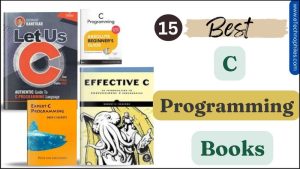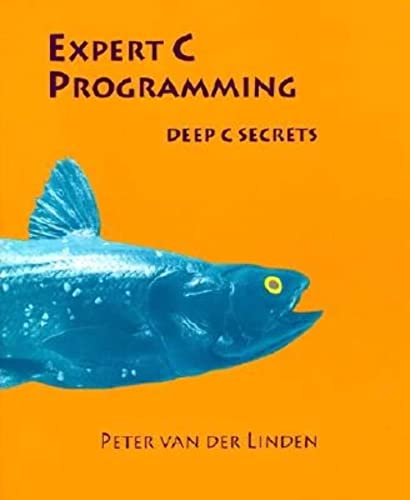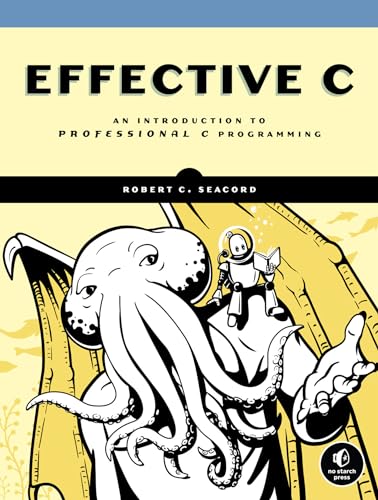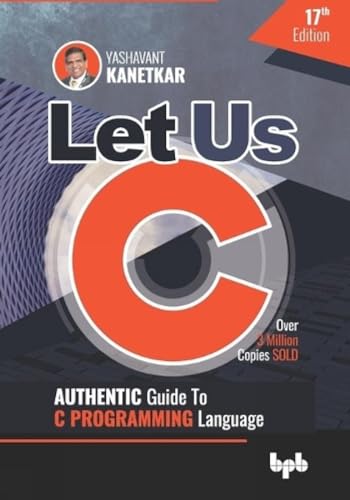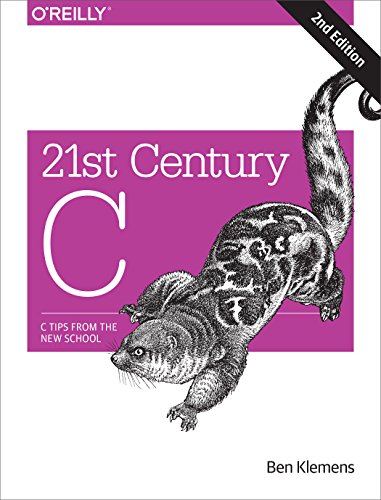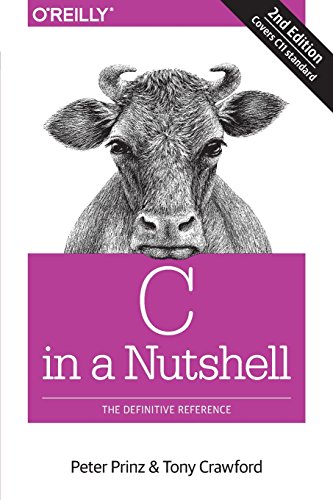Last updated on March 29th, 2024 at 04:26 pm
C is the most basic programming language. It is easy to learn and quite user-friendly. Most people who want to learn to program, start with the C programming language. Are you one of them and looking for a good book on C programming?
Deciding to learn the C programming language is an excellent decision as it is the base for all the programming languages. It doesn’t get easier than this. You can start here and then climb your way up.
For your C programming journey, we have compiled a list of 15 books that are widely used by beginners as well as experts.
Our top recommendations:
A Book On C (4th Edition) by Al Kelley and Ira Pohl
You can learn the ANSI C programming language with this book. It will not only teach you C but will also help to transition to C++ and Java once you have grasped this language. The book starts by explaining the syntax of C. But it doesn’t stop there. The author goes beyond to help you understand the underlying logic of each syntax. You will find this book to be very sorted and clarified.
Pros:
- All the material, right from abstract data types to function prototypes, is present in the book. You need not look anywhere else to master the C programming language.
Cons:
- No Kindle version is available for this book.
C Programming: Absolute Beginner’s Guide by Greg Perry and Dean Miller
This book boasts of the fact that you need not have any prior experience in coding to learn C programming. In this book, you learn to organize programs, work with variables and operators, store and display data, pointers, arrays, I/O, functions, and much more. Whatever operating system you are using – OS X, Linux, or Windows, this book is for you.
Pros:
- With consistent practice, you can code in C in no time with simply the help of this book.
Cons:
- Some of the links to sample codes provided in the Kindle version do not work.
Effective C by Robert C. Seacord
This book is an introduction to professional C programming. It widely focuses on safe and secure systems. If you are worried about the security of your programs then definitely read the book thoroughly to understand the security aspects at each step of your code. This is an amazing guide if you see yourself building working systems and solving real-life problems with C programming.
Pros:
- Each chapter contains practice code exercises so that you can get all the experience you need.
Cons:
- This is not a book for absolute newbies to programming. You need to have some prior knowledge of coding.
Learn C Programming by Jeff Szuhay
Who doesn’t like an easy way? This book gives you exactly that – an easy way to learn C programming. This book will create solid foundations for your programming journey. With this book, you will, of course, learn C programming but in conjunction with that, you will learn bits about software development. This makes this book ideal for beginners as well as experienced programmers.
Pros:
- You will acquire skills that are not restricted to C language but are also applicable to other programming languages.
Cons:
- There are errors in some of the sample codes which are not that difficult to spot but can get frustrating.
The C Programming Language (2nd Edition) by Brain W. Kernighan
The author follows the ANSI standard for C programming throughout the book. The book contains 8 chapters and 3 appendices. It covers most of the topics that any C programming book should have like control flow, functions and program structures, pointers and arrays, structures, input and output, the UNIX system interface, etc. The exercises at the end of each chapter make you think and use what you have learned to write a program all by yourself.
Pros:
- This 2nd edition of the book has been updated to meet all the latest standards and requirements.
Cons:
- You need to have a basic understanding of variables, assignment statements, loops, and functions in programming to start this book.
C Programming in easy steps by Mike McGrath
Looking for a fully illustrated, colored book on C programming? You got it. The book uses very little jargon that makes it easy to understand and follow. The contents of this book are displayed in a very simplified manner making C less confusing. Even a child could learn C programming with this book. You get links to sample codes to check your work every step of the way as you proceed through this book.
Pros:
- The book has been updated for the GNU Compiler version 6.3.0 and Windows 10.
Cons:
- The book doesn’t contain any different information than most C programming books. The only thing that makes it stand out is the color-coded and illustrated content.
Hands-On Network Programming With C by Lewis Van Winkle
Are you interested in learning socket programming in C? Then you should purchase this practical guide. When you are through, you will be able to write secure and optimized network code. You will basically get a grip on network protocols such as TCP and UDP and web protocols such as HTTP and HTTPS. You will gain experience with client-server applications in this book.
Pros:
- The book is applicable for Windows, macOS, and Linux operating systems.
Cons:
- The author has tried to cover many advanced topics in mere 614 pages. Due to that, enough explanation is lacking on most of the topics.
Pointers On C by Kenneth A. Reek
The author stated that this is unlike any other C programming book on the market. He gives a lot of focus on pointers in programming. According to him, pointers give C its power and hence deserve to be learned in more depth than usually are. The author discusses tradeoffs between efficiency and maintainability at the end of most chapters. This book is for professionals and advanced students.
Pros:
- The author provides programming tips and caution notes to get the best experience with C.
Cons:
- No Kindle version is available for this book.
- The paperback version of this book is expensive.
Let Us C by Yashavant Kanetkar
This is one of the most widely used books on C Programming. This book can be used as a textbook on C Programming as it has everything you will need to learn the language. The author starts with very basic elements of C and step-by-step takes you from simple to complex programs. The sample codes in this book are up-to-date and working. The end-of-the-chapter exercises make you a better programmer. And the elaborate notes at the end of each chapter help you recall all that you have learned.
Pros:
- This book has everything you will ever need to start coding in C. You will not need any external resources other than those mentioned in the book.
Cons:
- No Kindle version is available for this book.
21st Century C by Ben Klemens
If you think every book on C you lay your hand on is not updated then you should choose this book. Updated with all the latest advancements in C programming this book serves to be an excellent tutorial for C. This book teaches you wonders like advanced math, talking to internet servers, running databases with existing C libraries, building high-level and object-based libraries, using modern syntactic functions, and a lot more.
Pros:
- The author provides solid ideas for writing a clean code, gives good tips on efficient workflow, and teaches the use of excellent tools.
Cons:
- The author assumes that you have prior knowledge of C Grammar and CS. If you don’t then this book will be a tough read.
C in a Nutshell by Peter Prinz and Tony Crawford
We just found you a definitive reference book for C programming. The book has dedicated chapters on concepts and elements in C language such as memory management, types, statements, pointers, I/O, etc. The latest edition of this book has information regarding features compliant with the C11 standard. Very easy-to-understand sections on GNU software collection will teach you to use various GNU tools.
Pros:
- There is a clear distinction between the older C89/90 features and the newer C99/C11 revisions in the book.
Cons:
- The index of this book is poorly prepared. It’s to navigate certain concepts.
Practical C Programming by Steve Oualline
We present to you a practical handbook on C programming. Along with the mechanics of programming, this book will teach you to read, debug, and update programs with C. The author believes style and debugging are as important as syntax if not more. The most exciting thing about this book is the section on electronic archaeology which is the art of going through someone else’s code.
Pros:
- The book covers Windows as well as Linux compilers.
Cons:
- A beginner with very little experience in C will find this book useless as there are advanced concepts that need you to have a basic understanding of the language.
Expert C Programming by Peter Van Der Linden
Want to learn C programming in a fun way? There’s nothing better than this book. The author has maintained a humorous tone throughout the book which connects the reader very deeply with the material. The author uses stories, folklore, and anecdotes to explain the concepts of the C language. This book is not for beginners but rather for C programmers who want to expand their knowledge base.
Pros:
- At the end of each chapter, you find a section titled ‘Dome Light Relief’ which discusses recreational topics related to C.
Cons:
- The print quality of this book is very poor.
C Programming: A Modern Approach (2nd Edition) by K. N. King
A clear approach to C programming is followed in this book. The book is ideal for both students and professors. You will find coverage of both C89 and C99 standards. The author provides additional resources such as PowerPoint presentations of several concepts in the book and password-protected solutions and source codes to the exercises in the book. Our experts say that this is very easy to read and understood kind of book.
Pros:
- There are almost 500 exercises and programming projects, in the book, for you to get hands-on experience.
Cons:
- Several readers have found problems with the Kindle version of this book.
Programming in C by Stephen G. Kochan
Humans tend to learn more by example. This book adapts that technique to teach you C programming. Each new concept is illustrated by a C program. The author gives enough importance to good programming practices. Comprising 18 chapters and 5 appendices, this book is a complete package on C language. The end-of-the-chapter exercises are a great way to get practice in C programming.
Pros:
- The author has included elegant yet complete examples of C that demonstrate a compilable piece of code.
Cons:
- The Kindle edition of this book does not have page numbers which makes navigation difficult.
C is said to be the easiest programming language. But that doesn’t mean it should be taken lightly as it is the foundation for other programming languages.
If you are a complete beginner then take the help of the “C Programming- Absolute Beginner’s Guide” by Greg Perry and Dean Miller. It has everything you would like to learn.
If you are someone who just can’t read a dull reference book but wants to learn C programming then we recommend purchasing “C Programming in Easy Steps” by Mike McGrath. This book is completely color-coded and illustrated with pictures.
But our personal favorite is “The C Programming Language” by Brain W. Kernighan. May you be a beginner or an advanced reader you will not be disappointed with Mr. Kanetkar’s handy work.
